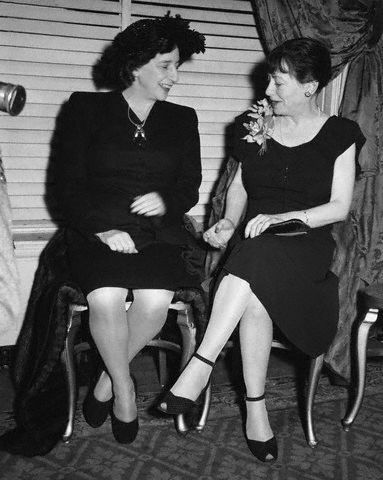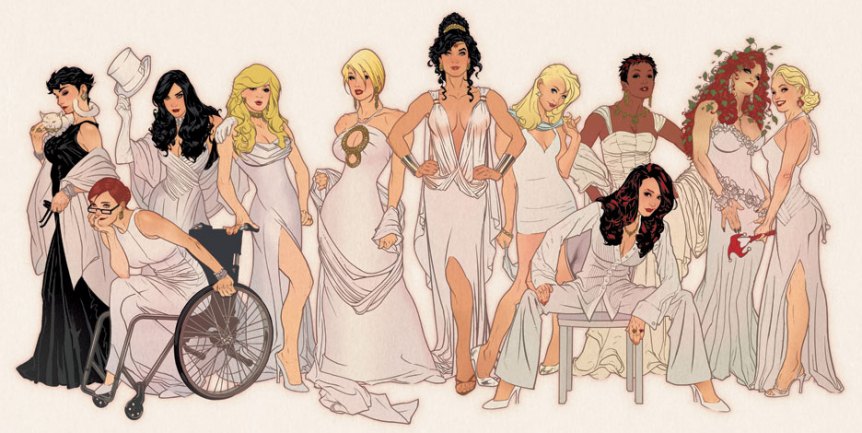
Lillian Hellman and Dorothy Parker
In the same week as International Women’s Day, a BBC headline read “Kylie Jenner becomes world’s youngest billionaire.” Wow! What are the chances? And the Beeb, notorious for tagging everyone as a member of some social/political group, didn’t even mention she was a woman. Now, that, girls and boys, is gender equality.
Actually, I not the least bit shocked to discover that Kylie Jenner is rich enough to buy a small country in Africa and turn it into a tanning salon for herself and her friends. After all, she’s been on the social media circuit since Paris Hilton was hot, and that was a number of years ago. (Ms. Hilton’s “leaked” sex tape was 2001.) Anyway, with more media coverage that an Ebola outbreak, it was almost impossible for Kylie not to get stinkin’ rich. And I, for one, say, “Good on ya!” I’ve never been opposed to people using their bodies to make a living; after all, professional athletes do it every day. Nor am I against self-promotion, although I am wary of such people. What I do wonder, however, especially on a day like today, is what history’s serious women would think about the antics of contemporary females like Kylie Jenner — self-proclaimed feminists who whore their privacy for trending fame and ungodly gain. What, for example, would Lillian Hellman have to say, or Martha Gellhorn or the tongue that launched a thousand quips, Dorothy Parker?
For those of you who don’t live on this planet, Kylie Jenner is the latest member of the Kardashian celebrity factory to cash in – big time! – on P.T. Barnum’s maxim “There’s a sucker born every minute”– and Lillian, Martha and Dorothy are her cultural great-grandmothers (from the 1930s) who cut the path for her to do it.
Oddly enough, on International Women’s Day, the last thing this world needs is yet another lesson in feminism. In fact, there is a significant portion of the population who think people like me (old, heterosexual white men) should just shut up and lay low for 24 hours. They may have a point; after all, I am a self-confessed relic of a different age. However, I think we need to stop the gender train for a moment, let everyone take three deep ones and get some historical perspective.
Way back in the day, the women who first strolled through the Men Only door in the media arts were just as young, just as wild and just as controversial as any trending personality we have today. Make no mistake: Hellman, Parker, Gellhorn and the rest drank and partied to excess. They smoked Virginia tobacco and Mexican marijuana. They listened to cool jazz and Cab Calloway’s hot jive. They had sex with who they wanted; when they wanted. They married, divorced and frequently took lovers. They broke rules. They danced in the streets. They were young and they acted like it. However, they were also serious women. They had something to say and they said it. Hellman’s The Children’s Hour (1934) dealt with lesbianism before most of America even knew it existed. Meanwhile, the outspoken Parker was eventually blacklisted for her sharp and uncompromising political views. At the same time, women like Martha Gellhorn and Margaret Bourke-White were making their bones as legitimate foreign correspondents. Gelllhorn covered the Spanish Civil War for Collier’s and Bourke-White went to the Soviet Union for Fortune Magazine. (She was the first Western journalist allowed in, by the way.) Others, like photojournalist Dorothea Lange, were picturing the Great Depression and painters like Frida Kahlo were painting it. When these women spoke, people stopped and listened.
Today, a lot of people are going to stop and listen to Kylie Jenner. They’re going to watch her on TV and follow her on social media. At twenty-two, her claim to fame is … uh … I don’t know what it is! However, she and her cohorts are smart business people. They know what sells, and they’ve packaged themselves as the product. This is not a sin.
However, on International Women’s Day, I wonder what the women from the 30s would make of what female role models have become.






